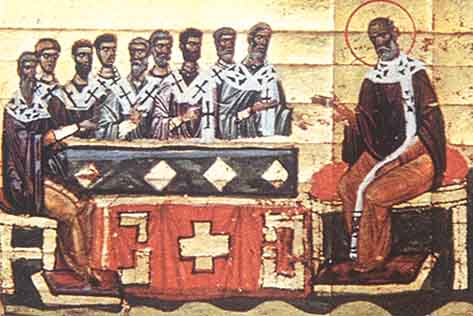A scene from The Canterbury Psalter (12th century)
Blog
“My God and Your God” (Nazianzus Explains)

In Gregory of Nazianzus’ fourth Theological Oration (Orat. 30), he takes up a number of Scriptural texts that Arians thought were “grand, irresistible arguments” (30.4) of their doctrine of a created Son. The fourth such text is John 20:17, in which the risen Jesus tells the disciples he is ascending to “my Father and your Father, to my God and your God.” The Arians pounce: If the Son has a God, he is created. But Nazianzus takes the opportunity to explain, in paragraph 8:
God is not called the Word’s “God” (how could God, in the proper sense of the term, have a “God”?) but God of the one people saw, in the same way as God is “Father,” not of the one people saw but of the Word.
In fact, there was a duality [διπλοῦς] about him, with the result that in both cases the reverse of what does or does not properly [κυρίως] apply to us holds good of him. In the proper sense of the term, God is our “God” but not our “Father.”
What leads heretics astray is the coupling together of titles, titles which, because of the intermingling, overlap. Which means that when the natures are distinguished, the titles are differentiated along with the ideas.
Listen to Paul’s words: “that the God of our Lord Jesus Christ, the Father of Glory . . . ” “God” goes with “Christ,” “Father” with “Glory.” Although both together make a single whole, it is by combination not by nature. What could be more straightforward?
What we have here is a set of distinctions driven largely by the incarnation, but then traced out across the trinitarian distinction between Father and Son, and ultimately stated in the form of a teaching about the first person of the Trinity. The resulting doctrine is that properly speaking the the Son has a Father and a creature has a God. But on the basis of the incarnation, it is legitimate to take up forms of speech that respect those immutable ontological boundaries and yet “couple together titles” [onomatōn epizeuxis] to say what Christ has made possible: The Son has a God, and we creatures have a Father. It’s a glorious exchange worked out in the person of the Son, whereby he takes our God as his God and gives us his Father as our Father.
What Gregory finds especially offensive about the Arian argument is how it ungratefully takes something the Son did for us and our salvation (get a God) and uses it to argue that the Son is by his very nature a creature ranked under a God.
Here’s the Greek:
Θεὸς δὲ λέγοιτο ἄν, οὐ τοῦ λόγου, τοῦ ὁρωμένου δέ· πῶς γὰρ ἂν εἴη τοῦ κυρίως θεοῦ θεός ; ὥσπερ καὶ πατήρ, οὐ τοῦ ὁρωμένου, τοῦ λόγου δέ.
καὶ γὰρ ἦν διπλοῦς· ὥστε τὸ μὲν κυρίως ἐπ ἀμφοῖν, τὸ δὲ οὐ κυρίως, ἐναντίως ἢ ἐφ ἡμῶν ἔχει. ἡμῶν γὰρ κυρίως μὲν θεός, οὐ κυρίως δὲ πατήρ.
καὶ τοῦτό ἐστιν ὃ ποιεῖ τοῖς αἱρετικοῖς τὴν πλάνην, ἡ τῶν ὀνομάτων ἐπίζευξις, ἐπαλλαττομένων τῶν ὀνομάτων διὰ τὴν σύγκρασιν. σημεῖον δέ· ἡνίκα αἱ φύσεις διίστανται, ταῖς ἐπινοίαις συνδιαιρεῖται καὶ τὰ ὀνόματα.
Παύλου λέγοντος ἄκουσον· Ἵνα ὁ θεὸς τοῦ κυρίου ἡμῶν Ἰησοῦ Χριστοῦ, ὁ πατὴρ τῆς δόξης.
Χριστοῦ μὲν θεός, τῆς δὲ δόξης πατήρ. εἰ γὰρ καὶ τὸ συναμφότερον ἕν,
ἀλλ’ οὐ τῇ φύσει, τῇ δὲ συνόδῳ τούτων. τί ἂν γένοιτο γνωριμώτερον;
[1] Gregory Nazianzus, Oration 30:8 in On God and Christ: The Five Theological Orations (Crestwood, NY: St. Vladimir’s Seminary Press, 2002) p. __ The Greek text is available at Perseus.
About This Blog

Fred Sanders is a theologian who tried to specialize in the doctrine of the Trinity, but found that everything in Christian life and thought is connected to the triune God.


